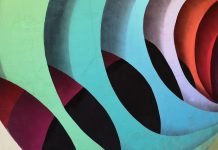What happens when what we know, what we live and feel leads us away from coherence and unity, and we are left only with fragments and irreconcilable versions of what is real?
The only realism in this context is the rendering of the momentary fragments of an inconclusive and self-referential dream.
These then are the chaotic and cryptic materials of living.
Each of us is submerged in multiple subjective worlds where every attempt to express life accurately only opens the door to another world.
If memory is said by neurologists to be more than fifty percent imagination, it is uncertain whether experience is anything at all.
Although everything is in question, time keeps passing, and it fills itself with places and events. Others may be present, perhaps. There seems to be a warmth.
Each moment dreams the next, some more obviously than others. Sometimes experiences seem to be readings of each other.
Since we can never begin an experience by being outside ourselves, such an outside may not even exist, and maybe we will never get there.
Perhaps the closest thing to being somewhere is finding that spot between worlds, the shoreline, where the liquid world meets the presumably solid world. It is only there, on that threshold, that the possibility presents itself of grabbing the tiger by the tail, of choosing which dream to step into and which to step away from.
***
1.
My house is full of lizards. Fleet and fulsome, incendiary emissaries, they are all different and all the same. They appear here and there, where they have leapt, like tongues of trembling flame. Fire peering from its folds and creases, my own small, sagging and off-kilter hovel, though old, persists alight with movement, like a lantern or a cranium. They flit and flash but glow translucent in their versioning of my walls. Fire that flows like blood, it streaks, minutely brushed by greens and rusted reds. Still the overall hue of these twisted traces is milky. They live off what gets trapped, what gets sifted in the bends of the house, in its turnings. The bumblebee we are left with; the gargantuan black moth that is now exhausted. Droplets pool and pock the reflected underside of things. Fire scorches out the corners, filling the center of room after room with blackened shadows to fall into.
Out of such darkness, like insects that give off a distinct smell when frightened, bits of self come scurrying forth. Such moments are neither rare nor habitual, yet they are always unmistakable, a warm wave of humiliation breaking me in two while I scramble to distance myself from the moment. The feeling has become stronger over the years that I am only partly able to understand what is happening to me. More often now, I have the sensation that my consciousness is not able to bridge my experience, that I am missing somehow much of what is happening to me. When occasionally I realize this, it seems as if I have awakened suddenly from a daze, that there is something I have forgotten, should have been paying attention to, and I know suddenly that I am adrift, that my will, armed with my partial and many times distorted perceptions, is hopelessly vulnerable in the face of the complex and simultaneous nature of reality.
I liked working, but I could not withstand the torture sessions, the allotment of physical pain as a kind of favor to one’s superior. I had the impression that I was getting somewhere, that I was almost to the point of concentrating and achieving something, when the little bell would sound and the secretary would call my name. I would have to descend the stairs beside the employee bathroom for the fifteen minutes of beatings and electroshock in the dark cells of the basement known as the Gym, once a fundamentalist catholic cult’s holding area for kidnapped local politicians. Such interruptions from my cubiclious meditations, however routine they may have been, made consistent progress impossible.
Later, they moved operations to the twenty-fourth floor of a building downtown, forbade us to use the elevator, presumably to keep us in shape, and placed operatives along the street who would pretend to ask us for change, only to later throw their raucous laughter and the coins in our faces. Work was amusing, yes, but the damage to the body was just too extreme.
Over the days that make up a month, I can almost hear the moon’s hinges, only to look up and see second-rate origami. Not just folded up and put away, as if it were someone’s chore, or the change of season. Rather give some grace to height. At least divide the circle into five simple petals. Extend the radius out as a halo, the minute-hand marking in turn the jeweled points of a crown.
2.
I have become increasingly convinced that a seamless subjectivity has swallowed me completely. The passing jets rumble the ceiling timbers of my little hollow, my snug cave at the periphery of importance. How far below the surface I feel, how far underneath, in my particularities. Sometimes I think I dream leaving here, going out the front door, the way someone would dream of Parma. Have I become bent over? Lost in some innard? No, there seems to be enough light, and though the plants could be healthier, life does not seem to be what I am cut off from. Rather one might say that the event I am hopelessly and ever more distant from would come under the heading of bustle and entanglement. Wishful thinking. There is more than enough bustle and entanglement right here. Just sputterings in the end, what I take down on paper, not privileged in any way. Deluded is almost a given now, diluted is painfully unacceptable.
Most of the time, I manage to remain partially oblivious about most things. A case in point is that I hardly ever think about the saddest part of things. For instance, I am just now struck by the sadness of territories. It is only when I am out in the open, when I feel that my perception could spread out like an ever-widening stain over things, endlessly diluted until almost transparent in its relationship to feeling, that such things come back to me.
The saddest thing about territories is that they curve. Sometimes drastically, other times almost imperceptibly, but always to some extent, leaving me or whomever on a ball of varying magnitude, forced to begin again at some point, betrayed by directionality. There is, then, a kind of finishing with things, which every territory makes apparent. And so, we cobble space together, depending on the insubstantial reiterations of memory. To think how often repetition seems to give a sense of meaning to things.
I accompanied a friend to go renew his identification card today. As we entered the civil service building, I was surprised to see a book on botulism displayed prominently in an office window. Whether it was this, or what followed that produced the faint nausea I had the rest of the day, I cannot tell. Once within the identity building, we sat in a vast anonymous lobby and waited for my friend’s number to be called. In the end, we were shuffled into a cramped, dusty room, painted in pea green and taken up almost entirely by a large, vertical piece of machinery. This contraption looked like a pair of railroad tracks upended to the ceiling with pulleys on them. The servants sat my friend in a chair with his back to the rails, and secured his waist to the chair and floor. They then attached his neck and shoulders to the pulleys. The idea was to pull on my friend’s spine from both ends until his vertebrae separated, photograph the resulting pattern, which is supposed to be highly individual, and this would serve as proof positive of his identity. This unfortunately involved a lot of screaming on my friend’s part and a curious lack of activity on the part of the servants once they had managed to separate the vertebrae for the picture. Rather than take the photo, they stood behind him gaping at his open spinal column, a couple of them laughing silently and pointing, another standing lost in amazed concentration. I think I even caught one masturbating quickly while the camera “warmed up”.
Once they had the spinal image, they then took a photograph of his face. The combination of the two images gave proof positive of his identity. Should his face change with time, he would be required to make another appointment, where assistants would beat the bones of his face with hammers until their structure was back to the form represented in the photo, this way ensuring positive onsite identification.
The cocoon of evening is a kind of death and transfiguration. It wraps its soft cottony tail around the senses, layer after translucent layer distancing sensation from the incident that might have occurred until the only direction left is inward, where a new context of dull blackness awaits.
3.
I get my own age wrong surprisingly often. But usually only by a year or two. I am by no means old, still the mental machinery is becoming increasingly mysterious. I am ascending into the cranium of my home. The wooden ceiling rafters are at my shoulders. I almost feel that I am being kept from bursting out by a certain pressure. That if help were at hand, someone might trepanate me out into the brisk air, to fill and wander the freshly clouded sky. I have put the stepladder on the dining room table and climbed up here to lure out a ringdove that has become trapped in the crawl space between two eaves. I gurgle as seductively as I can and I see the head turn and the small shiny eye focus on me. This process, I think as I continue perched there and nothing happens, bares a marked resemblance to trying to understand the suicide of a friend. I would not say so if I had not gone through it recently. But it is like this, one does not solve the problem, one never even gets close to the problem. Rather the problem changes on its own, or simply fades into all those things we are able to keep conveniently in the background of our lives. The dove steps away from me into the shadow, and after a few moments I am not sure it is still or was ever there. It occurs to me, optimistically, that maybe things will just stay this way.
How terribly lucid the afternoon was after the rain. So distinct and evocative, it seemed to be articulate. Curiously, the world in vivid focus is an experience like floating. The existence of others becomes unbearable and illusive. Decisions come cascading down from tree branches, raked and ordered for future application. The street is deserted. An angel searches in vain for someone to concern itself with. My intentions have gone soft, like an actor’s face, now rounded and lumpy. No one will be saving any lives this evening. As the pigeons fall upon the rice, the wall looms over the sleeping child. Night pours over the house.
One moment, dread is vast, and the next, it is just the burnt wall above the stove. Traces, what we are left with when we live something. Because we never live something while we are experiencing it. At that moment, we do not know how long things will last, where they are going, how to take all of those sensations in context. It is only after the event has occurred that we can begin to proportion it and remember how it bloomed each of its flowers. We can only begin to understand something once none of it is left.
Nobody gave a damn about the lemon tree. The old man wanted to rip it out. The tenant protested that it was not bothering anyone. Despite saying this, she did not water it nor take care of it. She used to tie one end of the washline to it. She complained to the old man about the state of the wall that separated her yard from her neighbor’s. The wall was falling apart. The old man refused to fix it, saying the neighbor had erected it on the neighbor’s property, and that he was powerless to do anything. Not surprisingly, over time the lemon tree died and became brittle. Much more surprisingly, the woman’s ex-husband, who was rumored to be a drunk and a drug addict, arrived one day to play with the child. They were in the yard, perhaps the child had made the ex-husband run around too much or something of the sort. In any case, the husband had an attack of rage and began to kick the lemon tree savagely. The child moved away from him in fear. The ex-husband managed to topple the lemon tree with his savage kicking. The falling tree pulled the washline, the other end of which tugged down the decrepit wall it was attached to, and this wall promptly fell upon the child. The tenant family, now reunited, are suing the old man for an injury to one of the child’s fingers.
I am in bed. The mattress, which up to this moment has remained reasonably solid, becomes liquid. More precisely, everything under the sheet upon which I am lying face down, becomes liquid and cold. I begin to sink into the liquid, but my sensation is of sinking into the folds in the sheet caused by my weight on it. The further I sink, the more the sheet wraps around me. I feel the cold of the liquid world, but only through the sheet. The sheet is my mask. It covers me with papers, it blinds me. It is my membrane. I no longer see, I have lost all spatial references, all is liquid, a pool. I try to reach out with my senses, see something, touch something, smell something, find some taste, some sound. Even conceptual references seem impossible. What is my room? What is my bed? Yes, this could be a dream, and it could go on forever without ever getting anywhere, without any kind of return. It is embarrassing to drown in a cliché. And yet this banal sinking brings me to where I am today.
4.
It can begin with something as simple as changing the side of the bed I sleep on. Did I write this before? Where and when? A multiplicity of worlds is just waiting in the wings, as it were. From the very first flip of the body, in the wrong direction, to avoid falling off the bed, a flood of confusion hurtles toward me. Being wrong about simple things, like whether I wear glasses all the time, begins to establish a democracy of frames of reference. Suddenly, I must do everything I can to pay back a loan to someone who does not exist. Slowly, I lower myself down the cliff-side over the edge of my mattress with ropes to save the life of a loved one sleeping soundly in the next room. The relief of waking in the banal, where there is no imminent danger, where the bills are almost paid for the month, where there is something vaguely possible to look forward to in the future. The shock of waking again, five minutes later, an old man dying of cancer, a humiliated boy late for school, speaking to someone in another language on a bitterly cold morning, discovering that my father’s house has a secret hidden floor, waking abruptly to pick up this notebook where it has fallen between my feet.
My sense of participation: I am driving a bus full of people, while sitting in the back seat. I yell for everyone to move their heads and let me see so I can avoid smashing us into something. Socialization in general evokes this screaming quality, like being sealed within a drum, eternally attentive. Does this isolation bring lucidity or distortion? Can a lens focus when it is trained on a mirror? Interference can easily be mistaken for silence. Rhythms are braided into breathing and seeing, and one at a time each of the other senses is inundated with background.
If I am ever to fit into society, I must learn to fall by myself. I no doubt continue to have an exceedingly high opinion of my own equilibrium and powers of adjustment. I detest my own aloofness, as grandmothers all around me shred each other over which of them has fashioned the most elaborate Christmas egg. Extra floors and stairs are being added to buildings in the business district for what are called “toning purposes”, which apparently is a vast improvement over having to go down to Calvinist basements every three hours for a little “twist and tug” and maybe a dangle over the crevice of hell or two. There is also a shortage of rhinoceroses for evening cultural events. This, at least, was the information recently given out by the Department of Free and Healthy Secrets.
As I say, my life has been embarrassingly easy. Its main drawback so far has been the incessant impression that its having continued in time is only attributable to a precarious balance.
In the Melantrichovan press, a controversy raged over which types of bread were admissible when proposing legislation. Apparently, by changing regulations over crust and color, judiciary officials can control what types
of laws local legislators can vote on. In the pictures, we see the voting public represented by a mass of people with signs referring to daily toil and the sweat from our brows, while in another we see a magistrate covering a loaf with an ornate napkin over the caption: I, and only I, shall decide on the admissibility of this bread.
5.
Living accompanied. I open my mouth, but before I manage to speak, she says –Yeah, okay, yeah. Eeriness has its limits. After that, it is all new material. Daily acts seen through the translucent green of the venus-flytrap’s mandible leaf. Absorbed in myself, I sometimes do not notice being absorbed by something else. Being swallowed, being digested, I become daily fare. A dustbin for this excess of mental pictures.
Though expressed as thoughts, the fabric of my hallucinations is always emotional. There is only how far or how close I am to the world and to others. Contact with what is around me becomes time. I find myself following the intricacies of others, listening to the heartbeat I am not carrying as if it will lead me out to the last limits of a forest of bells. As long as the world continues murmuring, I will continue to be deafened by it.
I stepped out again, and on my way back, the groceries weighing from my hands, I abruptly came upon a woman who had no head. I murmured my apologies to a space above her shoulders. I presumed she nodded politely in reply. I asked after her head. Not only had I been raised with no manners, but also this seemed to be a particular situation. Apparently, she had grown so tall that her head got in the way. Luckily, after a certain moment, everything above her shoulders began to fade and eventually vanished. The reason I insist on this process of fading is that it appears no one in her life seemed to notice at the time. Talking with her was also a very peculiar experience. Her voice had a sort of formalized decency and seemed to come from a generalized space around her. She said that since losing her head, she had become much more popular. In fact, she recommended it for everyone. I gazed at her. Her shoulders were the horizon at the end of a vast plain of diminutive flowers stamped on soft, airy cloth. She was on foot. A contemporary and meteoric super-secret enthusiasm had eaten her car, metaphorically of course. Something about credit. She was on her way to go stand in line somewhere.
She was saying something but I did not quite get it. It was difficult to understand what she was saying because she had no head. This lack made her voice echo around in an undefined way that for me was difficult to catch. But we were standing in the street and the usual thing was for me to respond in some way. She said she was tired, but she was referring to a vague impatience at being asked to go somewhere just to stand in line.
She was on her way to what was commonly referred to as the O-PAM. She had received a notification that she had missed one of her scheduled humiliations, and so had to appear at the Offices of Planned Actuarial Misery in order to stand in line to be routinely and senselessly mugged by strangers. This meant getting to the offices early enough to get a numbered token, given that armed thugs had long since been unionized and incorporated into the state system, reducing their availability, though recently there had been some talk of privatization to increase competition and foster a higher quality of service. Once her number were called, she would be given an appointment date and time and a corresponding public place, when and where she would be expected to appear for participation in the encounter. Every effort would be made to find a convenient time and place for the victim given her or his circumstances.
What if the mechanism of time had a glitch in it, like the elevator of an old hotel, that insisted on always taking you to the fourth floor before taking you to the floor you had requested. What if, rather than working like a wire carrying a set of linear impulses, it began functioning like a printing press, repeating mechanically a set portion of time, making endless copies of a given moment, as happens in melancholy, nostalgia, saudade. We return to a particular moment, creating alternate versions, distorting through excessive attention. A reality of versions of a very limited experience. Melancholy tricks with apples, ova coves of differing pressure, alignment, ink, never identical.
6.
Encounters. The inevitability of being swept away by the current of others, rushing down our streets and through our makeshift shelters. The light contained within each contact, sparking into the empathy of shared moments, where something is depleted or replenished. With time, the echo or feedback from such resonance becomes a ghost voice, the voice of a shade that keeps me company. Having known others in their beautiful orbits and disintegrations has created a voice within me that prepares me for death. This voice calms the hubris of living, the anxiety of locating myself in a particular skull. She speaks to me when grieving sorrow and anger threaten to be the only colors. She introduces me to the process of wilting and passing off the branch. The woman I live with is a universe I have travelled with astonishment and gratitude. Such a counterpoint of that which I am not has given meaning and heft to my life. On the other hand, this other voice within me is a whispered caress that permits me to sleep, to let everything outside of me go.
How many more years, days, hours will I be allowed to continue to live my way? To speak the way I speak, to sleep how and with whom I sleep, to go on within that tenuous space where I make my habitation? How much longer do I have? How many minutes of exactitude are left before fear, intolerance, and hate come to destroy this and make everything chaos again? How much longer will I have the luxury of watching the child grow and of cherishing the woman beside me? I know it is only a matter of time. And yet I refuse to let this poison arrive early. I refuse to let the fear be mine, the intolerance be mine, the hate be mine. It will come, and I hope to recognize it for what it is. But it is not of me, and until that day, all guests are welcome.
Leaving early is something anyone should be able to do; it’s okay, taking a powder, even for a father. I mean it is not anything I would hold against him. After all, he died from toxins inhaled during family conversation. You cannot get much more committed than that, even on a peanut farm. It is just that affection was for him simply another activity, mmmmmm, like, say, blowing bubbles. Whereas he could often be seen eating an apple with great passion and absorption. He once told me that, in his opinion, worrying about something was an almost purely self-serving way of passing the time.
As the old printing press reels, it begins to slip from its settings, and smudges, vague clouds of ink signifying nothing, begin to appear on some of the copies, on some of the versions. There they remain, indistinct but troubling, like specters whose sadness has left a waft of something, a trace of someone in the air, light but stubbornly resistant to erasure. This is the story of one of these smudges, of one of these specters, without the slightest lasting importance beyond the page he clings to, and more of an irritant than anything else in the version where he does occur. Even to himself, his past had a dimness like that frantic running around that fills dreams one falls into like falling off a cliff: immediate darkness followed by vertigo and then contact. Thinking about his past inevitably led him to exhaustion.
7.
Mites again. Invisible tiny mites moving across the surface of my skin, producing that slight itching. Protected from the so-called fresh air by the lenses of my glasses, they move over the flesh around my eyes. Meanwhile, behind my eyes, the thoughts jumble around, one on top of the other, this is ridiculous, I don’t even really know what the word “mites” means, foolishness, swarming, infested foolishness, those are the real mites, these thoughts crawling all over each other, eating away the peel around the ripe fruit of hysteria, of fear and anxiety, encasing me with itching from within, not letting me move, keeping me from escaping to somewhere I might breathe easily. But there is no “where” beyond the thoughts, beyond the itching, unless that where is something wretched, a tumor hardening asit grows, or some secret bleeding inside, locked within the nut of my head, in the darkness, hiving, nesting.
The immateriality of movement, implying always an erasure somehow. The gossamer nature of displacement, inevitably creating, however faint, a superimposition of backgrounds, flattening perspective by advancing into it, bleeding out color. What is the price we pay for moving toward contact, surface only, pressing only surface, the eyes without rest, the fingers calloused from moving over the meander of brailed deciphering, bound to the gesture of escape, attempting always just to graze relief rather than sink into it.
A friend said he remembered, meaning he carried around with him, only this: how with something between duty and reverence, he kissed the dipping stretch of skin between her shoulder blades.
It is odd that such real attributes never appear in make-believe versions of situations such as are conjured up all around us. Conjuring seems to be the meat of it, of living through and toward the next moment. Otherwise, having lived is like falling down a flight of stairs.
As he looked across the bridge at an afternoon seemingly rendered in stone, Osoby felt the old city pass through him as he passed through it, its smooth high walls funneling him, guiding him back toward certain moments. Melantrichova, the name of his city sounded like nostalgia making time stammer, while he himself was just another, more filler for its restaurant windows and train stations, always waiting for his own another to arrive. A welcoming drizzle made hash marks across the surface of our picture.
(end of the first of three portions)
About the Author
The son of Colombian parents, George Mario Angel Quintero was born in 1964 in San Francisco, California, where he spent his first thirty years. He studied literature at the University of California, and was a Wallace Stegner Fellow at Stanford University. Under the name George Angel, he has published poetry, fiction, and essays in English and a book of short fiction, The Fifth Season, won the 1995 Fiction Collective 2 Nilon Award. A new and selected poems, On the Voice, was published in 2016.Since 1995, he has lived in Medellin, Colombia, authoring seven books of poetry, and three books of theater plays all in Spanish under the name Mario Angel Quintero.
He continues to write and publish in both English and Spanish. He is a visual artist and the director and playwright of the theatre company ParpadoTeatro, as well as a founding member of several musical groups. He is regularly invited to share his work at international festivals. Portions of his work have been translated into Macedonian, Portuguese, Swedish, Croatian, Bulgarian, French, Italian, Albanian, and Arabic. Five books of his work came out in 2020: La materialidad (Fondo Editorial Ateneo) and Cardos (Editorial Párpado) in Spanish in Colombia, Divental’albero (SamueleEditores) in Italian in Italy, Mojesvjetloidrugepjesme (2020, Drugapriča) in Croatian in Croatia, and Aqrab (Dar Al Rafidain) in Arabic in Lebanon.












